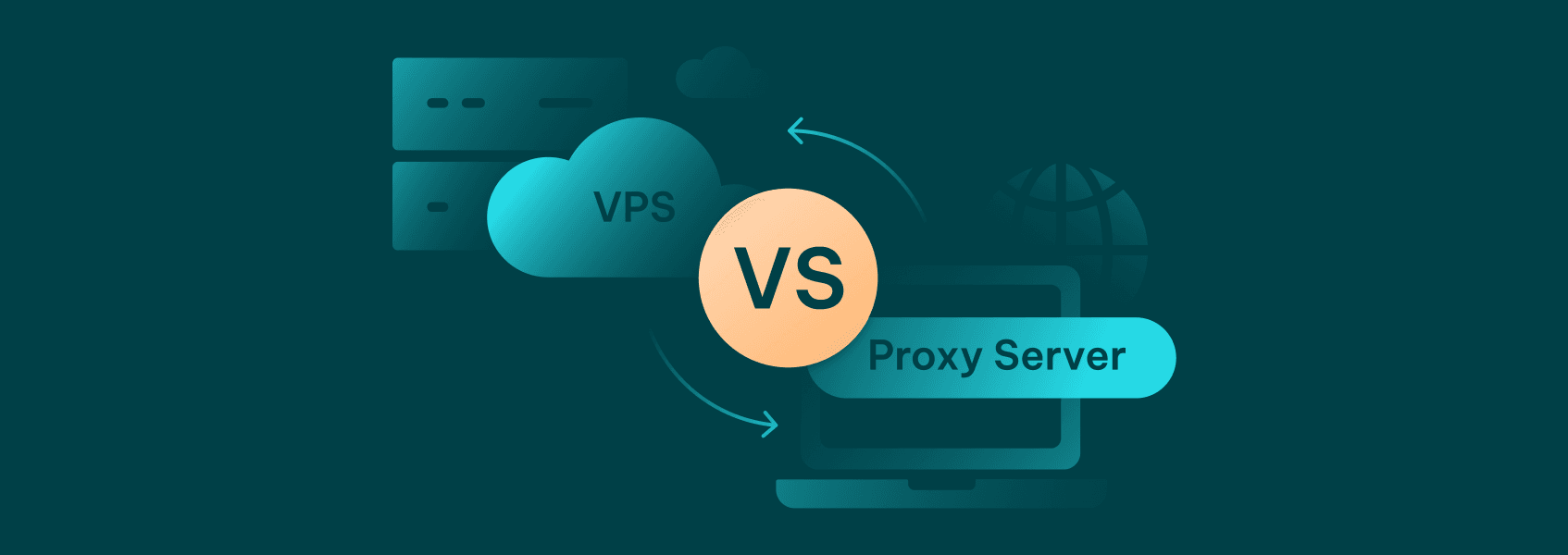Virtual Private Server (VPS) vs. Proxy Server: The Difference


Justas Palekas
In This Article
While VPS and proxy servers are often used interchangeably in conversation, it’s essential to recognize their distinct nature. Although both serve the purpose of concealing your IP address, they achieve this goal through different methods.
So, in order to help you make a well-informed decision, we’ll dive into the differences between a VPS and a proxy server.
What Is a Virtual Private Server?
It’s a virtualized server acting as a dedicated server within a larger physical server, with at least one IP address. A virtual private server is created by using virtualization technology to separate a physical server into numerous virtual ones, each operating independently with its own OS and resources.
In reality, it’s a software server mimicking a physical one, hosting websites, applications, and files and working on the OS level.
What Is a Proxy Server?
Residential proxies , as well as all other proxy types, function as an intermediary between your device and the internet. It’s like a bridge connecting you to the websites and apps you want to visit and use. Basically, the proxy server takes your connection requests and sends them to the intended destination on your behalf. Likewise, it relays the data sent from the websites and apps to you, working on the application level.
The proxy server carries its own IP address and presents it to the websites and apps as if it were your own. In the meantime, your original IP address and location stay hidden from the intended sites and apps.
Use Cases of a VPS and Proxy Servers
A VPS is an entire server with a fully-fledged OS and almost all the options of a standard, physical machine. It provides end-to-end encryption via SSL, so it’s best for hosting websites and cloud-based apps and storing files.
Common use cases of VPS include:
- Web hosting
- Hosting game servers
- Hosting email servers
- Developing and testing code and applications
Working on the application level, a proxy server protects a specific app or browser. It caches data and functions as a web filter or firewall.
Common use cases of proxy servers include:
- Geo-unblocking
- Geo-targeting
- Anonymous browsing
- Avoiding IP blocks
- Changing IPs
- Content filtering
Differences Between a VPS and a Proxy Server
A VPS works on an OS level, rerouting all your traffic through a VPS server, while proxy servers work on an application level, protecting one app at a time.
The first is mainly used for hosting websites and apps, while a proxy server functions as an intermediary between your target website or app and your device. So, if you need web hosting, a VPS is the best choice because you can’t host a website with proxies. Besides web servers and web files, you can also host a proxy server on a VPS if needed. For ultimate privacy, you can use a VPS proxy to ensure it doesn’t keep your original IP.
On the other hand, proxy servers are perfect for anonymous browsing and other online tasks that require privacy. Since they can give you access to millions of IPs, you can use them for tasks such as web scraping, multiple account creation/management, and bypassing geo-restrictions and IP bans.
A VPS can integrate with proxy servers in many ways , providing flexibility and customization options for users who require specific networking and privacy configurations in their online activities.
To Sum Up
A VPS and a proxy server are both good solutions for improved online privacy. However, they don’t work the same way and have different use cases. The first is well-suited for web hosting, whereas the latter is ideal for tasks demanding anonymity or multiple IPs.
So, make sure you consider their unique advantages and specific use cases before making a decision!

Author
Justas Palekas
Head of Product
Since day one, Justas has been essential in defining the way IPRoyal presents itself to the world. His experience in the proxy and marketing industry enabled IPRoyal to stay at the forefront of innovation, actively shaping the proxy business landscape. Justas focuses on developing and fine-tuning marketing strategies, attending industry-related events, and studying user behavior to ensure the best experience for IPRoyal clients worldwide. Outside of work, you’ll find him exploring the complexities of human behavior or delving into the startup ecosystem.
Learn More About Justas Palekas


